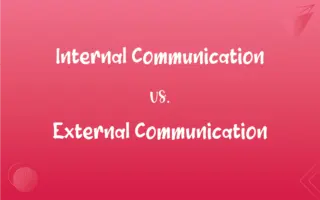Creativity vs. Innovation: What's the Difference?
Edited by Aimie Carlson || By Harlon Moss || Updated on October 17, 2023
Creativity is conceiving original ideas; innovation is implementing these ideas into practical solutions.

Key Differences
Creativity involves using imagination to generate unique ideas, often breaking away from traditional thought patterns. In contrast, innovation is the practical application or implementation of these creative ideas into new products, services, or processes that bring value.
Creativity is subjective, allowing individuals to express themselves in countless ways, irrespective of the practicality or marketability of the outcomes. On the other side, innovation demands a level of utility and often requires strategic planning, resources, and execution to achieve market acceptance.
Creativity thrives on freedom, the ability to explore, and divergent thinking, making it the cornerstone of artistic endeavors and theoretical concept development. Conversely, innovation involves convergent thinking, where the focus is on solving specific problems or meeting particular market needs through tangible solutions.
While creativity is an intrinsic quality, often associated with talents, hobbies, or personal traits, it doesn't necessarily lead to tangible outcomes. Innovation, however, is goal-oriented, aiming for tangible improvements in technology, business practices, or social constructs.
Creativity is the seed of thought that can occur in any setting or environment, without any pressure of realization. Innovation, however, often occurs in a business or scientific context, where the implementation of new ideas can lead to progress, growth, or competitive advantage.
ADVERTISEMENT
Comparison Chart
Definition
Generating new, original ideas
Implementing creative ideas practically
Focus
Idea conception
Execution of ideas
Requirements
Imagination, freedom
Resources, strategy, execution
Outcomes
Intangible, subjective
Tangible, value-driven
Context
Personal, artistic
Often business, scientific
ADVERTISEMENT
Creativity and Innovation Definitions
Creativity
Creativity involves thinking outside traditional frameworks.
Solving complex problems often requires a dash of creativity.
Innovation
Innovation often requires strategic planning and resources.
Their commitment to innovation is evident in their R&D investment.
Creativity
Creativity is the ability to produce original and unusual ideas.
Her creativity shines in her eclectic house decor.
Innovation
Innovation involves the successful implementation of creative ideas.
Technological innovation has drastically reshaped our daily lives.
Creativity
Creativity is often the inception point of groundbreaking concepts.
Historical advances in art and science stem from bursts of creativity.
Innovation
Innovation aims for improvements in existing systems, products, or processes.
Continuous innovation is key to staying competitive in the business world.
Creativity
Creativity is marked by expressiveness and imagination.
His stories brim with creativity, transporting readers to new worlds.
Innovation
Innovation is the process of turning an idea into a solution that adds value.
The company's innovation led to a revolutionary new product.
Creativity
Creativity can be spontaneous and not always directed.
She carries a notebook to capture flashes of creativity.
Innovation
Innovation is crucial for economic growth and societal advancement.
Medical innovation has significantly increased life expectancy worldwide.
Creativity
Having the ability or power to create
Human beings are creative animals.
Innovation
The act of introducing something new.
Creativity
Productive; creating.
Innovation
Something newly introduced.
Creativity
Characterized by originality and expressiveness; imaginative
Creative writing.
Creativity
One who displays productive originality
The creatives in the advertising department.
Creativity
The ability to use imagination to produce a novel idea or product.
His creativity is unsurpassed by his fellow students in the art class.
Creativity
The ability to create
FAQs
Can creativity be learned?
Yes, it can be nurtured and developed.
How does creativity occur?
Through a combination of intrinsic talent and environmental influences.
What is creativity?
The ability to generate original, novel ideas.
Is creativity only about arts?
No, it applies to any field, including business and science.
Is innovation always technological?
No, it can be procedural, organizational, or even social.
Can every organization innovate?
Yes, with the right resources and mindset.
Why is innovation important in business?
It drives growth, competitiveness, and market relevance.
Is innovation always successful?
No, it involves risk and potential failure.
How can I boost my creativity?
Embrace new experiences, hobbies, and divergent thinking.
Are there jobs focused on creativity?
Yes, many fields rely on creative thinking, like design and marketing.
How is innovation managed in large corporations?
Through dedicated R&D departments, innovation labs, or strategic partnerships.
Can creativity be measured?
It's subjective but certain tests and criteria attempt to gauge it.
What is innovation?
Applying creative ideas practically to create valuable solutions.
Are people born with creativity?
Traits may be innate, but environment and experiences greatly influence it.
Can small businesses innovate?
Absolutely, often being more agile in adopting new ideas.
Is there a formula for innovation?
No, but it thrives on open-mindedness, resources, and risk-taking.
Does creativity diminish with age?
Not necessarily; it evolves and can even flourish.
Is creativity valued in the workplace?
Yes, especially in problem-solving and strategy development.
Do innovations have to be complex?
No, some of the most impactful innovations are surprisingly simple.
How do innovations affect markets?
They can create new demand, improve supply, or disrupt existing markets.
About Author
Written by
Harlon MossHarlon is a seasoned quality moderator and accomplished content writer for Difference Wiki. An alumnus of the prestigious University of California, he earned his degree in Computer Science. Leveraging his academic background, Harlon brings a meticulous and informed perspective to his work, ensuring content accuracy and excellence.
Edited by
Aimie CarlsonAimie Carlson, holding a master's degree in English literature, is a fervent English language enthusiast. She lends her writing talents to Difference Wiki, a prominent website that specializes in comparisons, offering readers insightful analyses that both captivate and inform.






































































